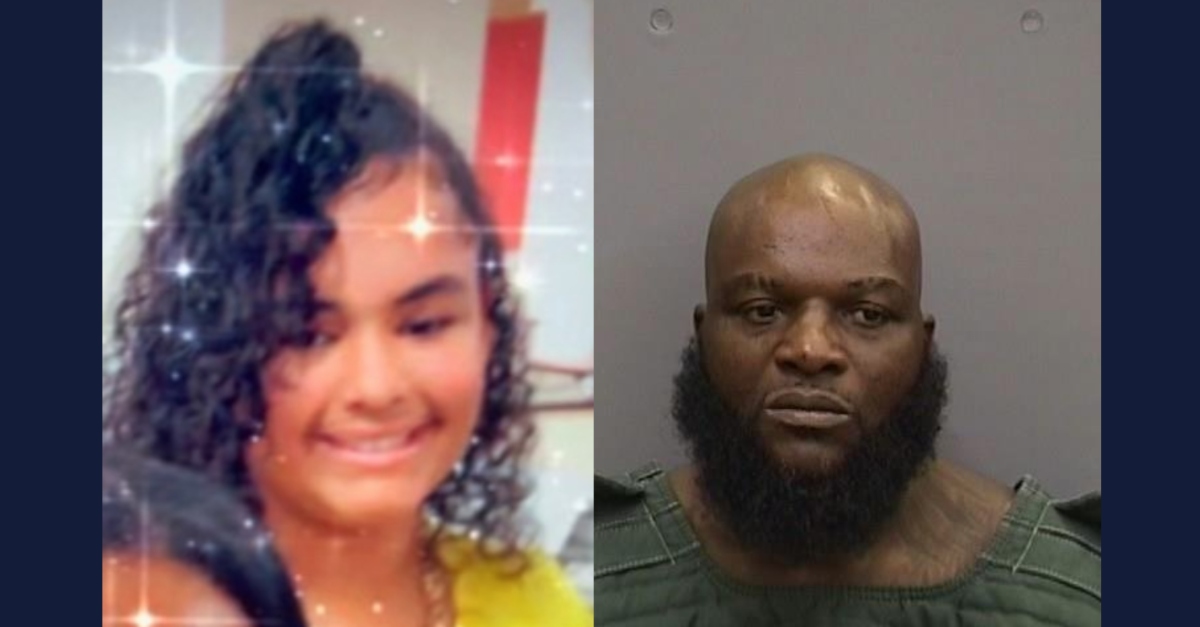
Nilexia B. Alexander and Ronny Tremel Walker.
Prosecutors in Florida are seeking the death penalty against a 44-year-old man accused of fatally shooting a 14-year-old girl and abandoning her body in a vacant field earlier this year. Prosecutors with the Hillsborough State Attorney’s Office on Friday filed a Notice of Intent to Seek the Death Penalty against Ronny Tremel Walker, also known as “Ronnie,” for the cold-blooded murder of young Nilexia B. Alexander, court documents reviewed by Law&Crime show.
Walker was arrested and charged in July with one count of first-degree premeditated murder with a firearm in Nilexia’s death. He was previously convicted of manslaughter for fatally shooting 45-year-old Elaine Caldwell in 2003.
According to a copy of the notice filed in the Thirteenth Judicial Circuit for Hillsborough County, prosecutors with the State Attorney’s Office assert that they can prove three aggravating factors that would make Walker eligible to be put to death by the state if convicted.
“The capital felony was committed by a person previously convicted of another capital felony or of a felony involving the use or threat of violence to the person,” the filing states.
Additionally, prosecutors asserted that the crime was “especially heinous, atrocious, or cruel” and “committed in a cold, calculated, and premeditated manner without any pretense of moral or legal justification.”
As previously reported by Law&Crime, Nilexia was found dead by the road near the 100 block of Floribraska Avenue in the early morning of May 6, police said. The person who called 911 reported hearing gunfire, went outside, and found a young girl lying motionless on the ground, Deputy Police Chief Calvin Johnson told reporters. Officers responded to the scene at approximately 3:58 a.m. and found Nilexia dead from what appeared to be gunshot wounds.
Nilexia had run away from the Temple Terrace home where she lived with her mother, Ashley Alexander, 10 days prior to being found dead, according to police.
Chief Johnson previously explained that investigators were able to connect Walker to the murder by showing that his vehicle was in the area where Nilexia’s body was discovered at the time of her death. Location data from the victim’s cell phone also placed Nilexia inside of Walker’s vehicle at the time of the slaying.
Investigators subsequently obtained and executed a search warrant on Walker’s vehicle and reportedly found blood spatter on the front and rear passenger doors. DNA samples were taken and turned over to the Florida Department of Law Enforcement (FDLE) for analysis.
The DNA samples obtained from the vehicle came back as positive matches for Nilexia’s DNA, according to police. The defendant was subsequently taken into custody by police and agents with the U.S. Marshals Service.
In an interview with the Tampa Bay Times on Monday, Nilexia’s mother said that prosecutors had come to her several weeks prior and asked her what she hoped would happen to Walker if he was guilty of Nilexia’s murder.
“I did tell them I was pushing death,” she reportedly told the newspaper. “If he can take someone’s life like there’s nothing to it, he doesn’t deserve his own,” she said.
During a July press conference, State Attorney Andrew Warren acknowledged Walker’s prior homicide conviction. Records show he was previously in prison for manslaughter by culpable negligence.
Prosecutors said he was the armed man who stormed a home on Oct. 23, 2003, fatally shooting Caldwell after she saw his gun and did not stop screaming. Walker was originally charged in 2009 with first-degree murder, but that trial ended in a hung jury, according to a ruling from the Florida Second District Court of Appeal. The state tried him again for second-degree murder, and jurors this time convicted Walker of manslaughter.
That lesser conviction was overturned when the Florida Second District Court of Appeal determined that most of the evidence connecting Walker to the crime was flimsy.
The opinion noted, for example, that Caldwell’s boyfriend, who witnessed the shooting, named Walker as the suspect based on identifying information from an unknown third party, which prosecutors referenced multiple times throughout the trial. The appellate court ruled that this was inadmissible hearsay.
The judges also noted other weaknesses in the state’s case against Walker at the time.
“[T]he evidence against Walker was tenuous because there was no physical evidence connecting Walker with the crimes and his identification was significantly impeached,” then-Chief Judge Morris Silberman wrote. “Furthermore, some of the evidence was actually inconsistent with Walker’s being the perpetrator. The perpetrator had told the nine-year-old victim that he had two daughters at home, but Walker has sons. And while Walker’s fingerprints were not found at the scene, a palm print of an unidentified third party was found.”
Walker’s conviction was overturned and the judges ordered a new trial. Walker ultimately pleaded guilty, state authorities told Law&Crime.
“After the manslaughter conviction was overturned, Walker pled guilty to manslaughter with a firearm, burglary of a dwelling and robbery with a firearm and was sentenced to 8 years in prison followed by 7 years of probation,” Warren’s Policy Advisor Jordan Teuber said in an email.
Walker ended up serving four more years behind bars for violating the terms of his probation by drinking alcohol, Warren also said.
A second suspect, 45-year-old Robert Quincy Creed Jr., is also facing one count of accessory after the fact to first-degree murder in Nilexia’s slaying.
Walker is currently being held without bond at the Hillsborough County Jail and is scheduled to appear for a virtual competency hearing on Oct. 10.
See the filing below.
Alberto Luperon contributed to this report.
[Images via Tampa Police Department]